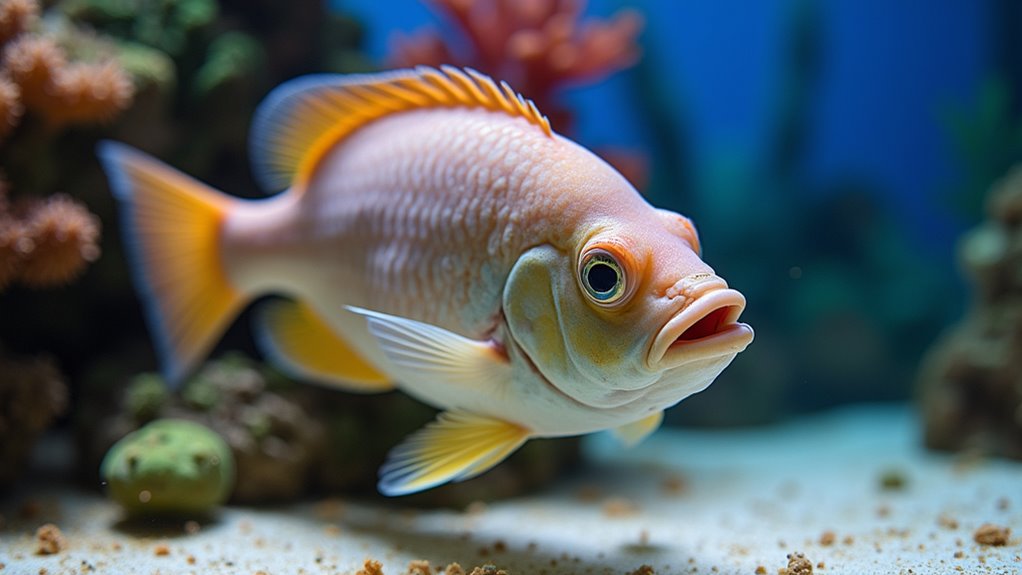To spot a sick fish, watch for signs like hiding more than usual, erratic swimming, or loss of appetite. Look for physical changes such as clamped fins, spots, discoloration, or swollen bellies. Abnormal swimming patterns like circling or frantically darting indicate trouble. Also, check water quality regularly, as poor conditions can cause illness. If you keep an eye out for these symptoms, you’ll be better equipped to spot problems early and learn effective treatments.
Key Takeaways
- Observe behavioral changes such as hiding, erratic swimming, or loss of appetite to identify potential health issues.
- Look for physical abnormalities like spots, lesions, fin damage, or discoloration signaling disease.
- Monitor swimming patterns for signs of neurological problems, such as circling or uncoordinated movements.
- Check water quality regularly, as poor conditions can cause or worsen fish illnesses.
- Detect early symptoms like clamped fins or unusual patches to facilitate prompt diagnosis and treatment.

Recognizing the signs of a sick fish is essential for maintaining a healthy aquarium. When your fish starts to behave differently or shows physical abnormalities, it’s a clear indication that something’s wrong. Paying close attention to these signs allows you to catch illnesses early, increasing the chances of successful treatment and preventing the spread to other tank inhabitants.
Behavior changes are often the first noticeable indicators that your fish isn’t feeling well. If you observe your fish hiding more than usual, swimming erratically, or lingering near the surface or bottom of the tank, these could be signs of distress or illness. A healthy fish typically swims smoothly and explores its environment confidently. Sudden loss of appetite or refusal to eat is another red flag, suggesting discomfort or disease. Additionally, if your fish becomes lethargic or spends excessive time resting, it might be battling an infection or other health issues. Keep an eye out for abnormal swimming patterns, such as frantically darting around or circling in one spot, as these behaviors often point to neurological problems or parasites. Regular aquarium maintenance and water testing can help prevent some of these issues from arising.
Physical abnormalities are equally important to monitor. Look for visible changes in your fish’s body, such as bloated or sunken bellies, unusual spots, or lesions. Clamped fins—where the fins are held close to the body—can indicate stress or illness. Fins that are frayed, torn, or have ragged edges may suggest fin rot or injury. Discoloration or patches that differ from your fish’s normal hue can also be signs of infections or parasitic infestations. If your fish develops white spots, fuzzy patches, or ulcers, these are clear symptoms of common diseases like ich or bacterial infections. Additionally, watch for unusual growths or swelling, which might indicate tumors or internal problems. Being aware of divorce laws and procedures can also help you navigate complex situations if you find yourself needing legal assistance related to personal disputes. Recognizing early physical signs allows for prompt intervention, which is crucial for successful treatment.
It’s also beneficial to recognize that poor water quality can significantly impact your fish’s health, making regular water testing an essential part of aquarium maintenance. Combining observations of behavior changes with physical abnormalities gives you a *thorough* picture of your fish’s health. Early detection is key; the sooner you notice these signs, the quicker you can take action—whether that’s adjusting water parameters, increasing tank maintenance, or consulting an aquatic veterinarian. Remember, a healthy fish is active, has bright coloration, and swims confidently. If you notice deviations from this norm, it’s time to investigate further. Regularly inspecting your fish and their environment helps you catch problems early, ensuring your aquatic friends stay happy and healthy.
Frequently Asked Questions
How Can I Prevent Fish Diseases Before They Occur?
To prevent fish diseases before they occur, you should focus on maintaining good aquarium hygiene and providing proper nutrition. Regularly clean your tank to remove waste and debris, which helps prevent harmful bacteria buildup. Feed your fish a balanced diet to strengthen their immune systems. Additionally, monitor water quality and avoid overstocking. These practices create a healthy environment, reducing the likelihood of disease and keeping your fish thriving.
What Are the Best Quarantine Procedures for New Fish?
When bringing new fish into your tank, you should quarantine them for at least two weeks to prevent disease transmission. Keep them in a separate tank with clean water, monitor their health daily, and avoid mixing them with existing fish until you’re sure they’re healthy. During quarantine, observe for any signs of illness and maintain ideal water conditions. This process helps ensure your main tank stays disease-free.
Are There Natural Remedies for Common Fish Illnesses?
Did you know that over 70% of fish owners turn to natural remedies? You might find herbal remedies and dietary supplements helpful for common fish illnesses. These options can boost your fish’s immune system and promote healing without harsh chemicals. Always research specific treatments for your fish’s condition, and consult a vet if you’re unsure. Natural remedies are a gentle, effective way to support your fish’s health.
How Often Should I Test Water Quality for Fish Health?
You should perform water testing regularly to guarantee your fish stay healthy. The frequency monitoring depends on your tank size, fish type, and filtration system, but generally, test weekly for key parameters like ammonia, nitrite, nitrate, and pH. If you notice any issues or changes in behavior, increase the testing frequency. Consistent water testing helps catch problems early, preventing illness and maintaining a safe environment for your fish.
When Should I Seek Professional Veterinary Help for My Fish?
When your fish shows persistent signs of illness, abnormal behavior, or unusual appearance, it’s time to seek professional veterinary help. Don’t rely solely on fish medication; prioritize fish health monitoring to catch issues early. If treatments don’t improve your fish’s condition or if symptoms worsen, consulting an aquatic vet guarantees proper diagnosis and effective care. Prompt action keeps your fish healthy and your aquarium thriving.
Conclusion
Remember, your fish’s health is like a delicate dance—you’re the lead. Spotting early signs of illness can save your fish’s life and keep your tank thriving. Don’t ignore those subtle changes; they’re the whispers of trouble. By staying vigilant, you become the guardian of their well-being. After all, isn’t it worth fighting for those shimmering fins and bright eyes? Stay attentive, act quickly, and cherish every moment with your aquatic friend.










